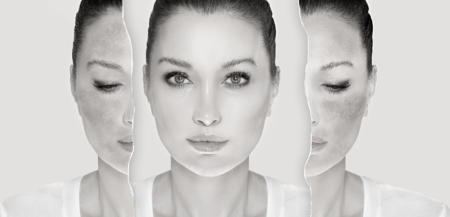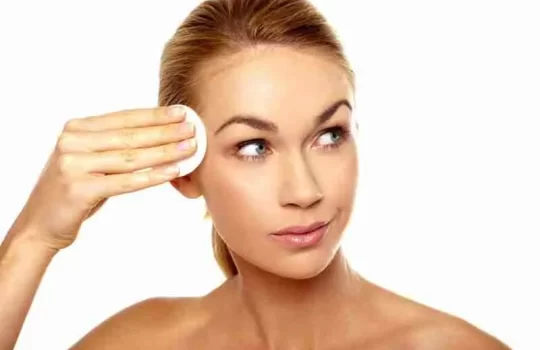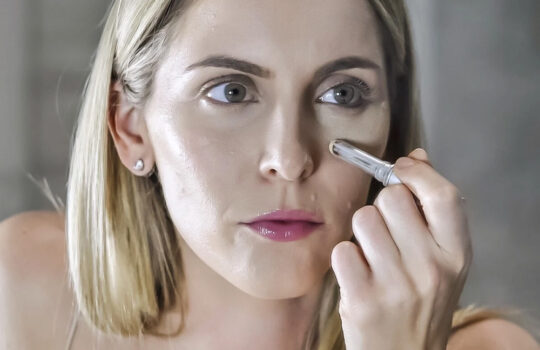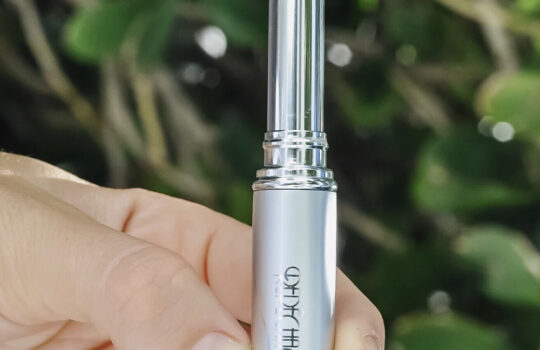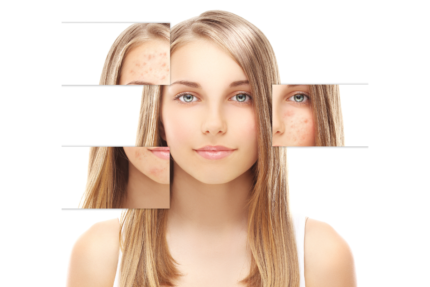Did you know that hyperpigmentation problems are best addressed before you step out in the summer sun? And, did you know that there are foods that can make hyperpigmentation worse?
Here, we�ve asked leading experts in the health/beauty field, Lydia Sarfati, CEO and Founder of Rep�chage Skin Care, pioneers of sustainably-harvested, seaweed based skin care, and Natalya Fazylova, DNP of ReBalance Integrative Medicine and Anti-Aging Center in NYC to share some surprising facts and tips on how to deal with skin problems like hyperpigmentation now.
1. Sun isn�t the only cause of hyperpigmentation
With summer coming, everyone wants to get some sunshine, and we all know (we hope!) that you can�t go out in the sun without proper protection. But there could be other underlying reasons for hyperpigmentation than UV light.
According to Dr. Fazylova, while it�s true that there is an increase in the production of melatonin in the outermost layer of the skin when exposed unprotected to UV, some people are more prone to develop it, and for different reasons.
�There are different types of hyperpigmentation. We have some hyperpigmentation that is related purely to sun exposure, but there is also hyperpigmentation caused by hormonal imbalance such as melasma, which women can get during pregnancy, menopause or from taking birth control pills. There are also some women who, as they get older, get what some people call liver spots. These are the spots that you see on their hands, and all over the body. And there�s a reason why they call them liver spots. Our liver is responsible for metabolizing, detoxifying and getting rid of all the chemicals and whatever else gets into our body, but when our liver gets toxic, and when it gets clogged up, the build-up of hormones and toxins exhibits itself by coming out on the outside on the skin.�
2. Did you know that foods and even fragrances you eat can trigger photo-sensitivity?
There are foods that you eat or become exposed to that can trigger photo sensitivity reactions that can lead to hyperpigmentation, says Sarfati. Sometimes called �Margarita burns,� it is the result of when a chemical called furocoumarin reacts with sunlight. This chemical is found in limes and citrus fruits, along with celery, figs, fennel, and a number of other plants.
Also certain fragrances that contain Oil of Bergamot can cause hyperpigmentation if left on the skin in the sun. And, believe it or not, drinking tea. Tea like Earl Grey contains bergamot oil which, combined with sun exposure, may cause dark spots.
Both Sarfati and Dr. Fazylova point out that some cultures seem to know what to eat and drink to avoid hyperpigmentation. �When I was in Greece, I would see women drinking ouzo and eating watermelon. Ouzo has licorice extract in it, which is known to help reduce hyperpigmentation, and watermelon extract protects you from the DNA damage caused by UV light on the skin. So certain things in certain countries that people do traditionally can help them retain an even-toned complexion.�
Other foods that might help protect against hyperpigmentation are mushrooms, which is a source of Kojic Acid, that has the ability to inhibit tyrosinase activity in synthesis of melanin.
Particular seaweeds are also a source of many important nutrients that are antioxidant and provide important nutrients inside and out, including polyunsaturated fatty acids, enzymes and bioactive peptides. Essential fatty acids help maintain our skin�s barrier, and polysaccharides such as Alginic Acid, help to lock moisture into our skin. Among marine resources, it is also one of the richest sources of natural antioxidants such as phlorotannins, sulfated polysaccharides, fucosterol and fucoxanthins.
3. How to address hyperpigmentation from an internal perspective
According to Dr. Fazylova, treatments that combine both internal and external treatments show the best results. In her clinic, for example, they approach treating hyperpigmention by addressing hormonal imbalances, IV drips or infusions, and by also providing skin care.

One of the first things Dr Fazylova does is to view the client�s medication history because there are a wide range of medications that cause hyperpigmentation. These include
- Birth control pills, because they go through hormonal passages
- Certain antidepressant medications or Amitriptyline for bipolar disorder or necrotic neuropathy, can cause hyperpigmentation as well.
- Some of the medications for cholesterol
- Some of the medications for seizure disorder like Tegretol
- Antibiotics such as tetracycline, can cause hypersensitivity to the sun.
�Part of it is caused by the fact that most of those medications are metabolized through the liver and they actually decrease liver function, so it�s probably not the medication itself but the fact that they have an effect on the liver that causes hyperpigmentation,� says Dr. Fazylova. Increased photosensitivity plus laser treatments can cause extreme reactions and even burning if you go out in the sun, so consulting with your laser treatment therapist about your medications is crucial.
According to Dr. Fazylova, when treating someone hyperpigmentation, is to get their medical history and check their hormone levels first. �If that�s the cause, I need to balance the hormones to get the best results while we�re trying to fix the skin as well.�
Dr. Fazylova also performs infusions, or IV drips of glutathionecombined with other ingredients.
�Glutathione helps our body to purify and detoxify. If the liver is clogged up and not properly working, the production of glutathione is decreased, which means that you are not metabolizing the hormones properly and you�re not producing enough glutathione to clean the liver. What will happen with all this toxicity that you are keeping in your body�to the biggest organ that you have, your skin. So, by addressing this with a glutathione and Vitamin C drip, you are detoxing the liver. I combine this with adjusting the diet, and hormones.�
Dr Fazylova also points out how improper treatment and maintenance by improperly trained skin care professionals can cause more damage than good. �A lot of things that I see, what other people are doing, they are getting rid of hyperpigmentation by doing lasers, by doing peels, dermabrasion, more aggressive treatments to remove the superficial layer of the skin, from outside, but as soon as the patient goes outside, if they didn�t fix the problem that caused it to begin with, the hyperpigmentation comes back.”
5. Treating the skin
According to Sarfati, she started to incorporate glutathione into Rep�chage products several years ago. �I came across an ingredient some time ago,� says Sarfati. �It is a small tri-peptide, which is three small amino acids. Internally, this is very important to helping metabolize everything in your body, but externally, it is a super powerful antioxidant as well as helpful in the purification and detoxification of the skin. I think of it as a magical ingredient, especially when mixed with our sustainably-harvested seaweed which contains 12 vitamins, 18 amino acids and 42 minerals and trace elements�

Sarfati points out that in the past, dermatologist prescribed hydroquinone to reduce hyperpigmentation, which only caused the formation of white spots, and had been found to store in the liver. Alternatively, dermatologists and plastic surgeons used very aggressive peels, which is also not a solution.
Sarfati took a more holistic approach with the formulation of brightening products from Rep�chage. �We look at the skin from the outside in.�
Ingredients found in the Biolight� Collection for Dull, Uneven Skin, include Oxidized Glutathione,a molecule found naturally within the skin that is known to play an important role in preventing oxidative damage and has been found to help lessen the appearance of uneven skin tone, and Diglucosyl Gallic Acid (DGA). DGA is known to be more potent than Vitamin C and Kojic Acid, this ingredient is known to help restore a perfect-looking complexion while it helps even the appearance of the skin tone.
Alpha Arbutinis another known skin brightener,a natural ingredient derived from the leaves of bearberry, cranberry, mulberry or blueberry shrubs, and also is present in most types of pears. Kojic acidis a potent brightener derived from a by-product in the fermentation process of malting rice for use in the manufacturing of sake, the Japanese rice wine. Azelaic acid:Azelaic acid is a component of grains, such as wheat, rye, and barley, known for its skin brightening ability. Vitamin Cand its various forms of ascorbic acid, has been shown to be an effective skin exfoliant. Gotu Kola Extractis a plant known in Asia for its beneficial effects that helps to reduce the appearance of visible signs of aging. Hexapeptide-2 is a fast-acting peptide that helps to brighten the appearance of the skin. Willow Bark Extract is extracted from the white willow tree (Salix Alba) this ingredient helps with mild exfoliation of dead skin cells to reveal a more youthful complexion. Licorice Extractis known for helping to brighten the appearance of the skin and Bellis Daisy is an ingredient that helps to decrease the appearance of age spots; derived from the daisy flower.
One of the things people can do today, at home to address dark spots and uneven skin tone, is to use the Biolight� Brightening Skin Correct Serum. The Skin Correct Serum includes Laminaria Digitata, Ascophyllum Nodosum, Licorice Root extract, Willow Bark extract, Diglucosyl Gallic Acid (DGA), Ginger Root extract, and Sodium Hyaluronate/Hyaluronic Acid, so it�s not only helping with the hyperpigmentation but also smoothing out fine lines and wrinkles. The Sheet Mask is a perfect solution for that hyperpigmentated skin, helping skin look brighter, and more even toned. This sheet mask is loaded with actives that really work deep with the surface of the skin, including Glutathione, Laminaria Digitata, Ascophyllum Nodosum, Arbutin, DGA, Sodium Hyaluronate, Willow Bark Extracts, and Licorice Root Extracts,
Apply the Biolight Correct Serum onto the skin with the effleurage movements to the face, neck and d�collet� for five minutes. Then, apply the sheet mask onto the face as instructed above. Once the sheet mask is applied, you can use the LED set (available on request) for Yellow/Amber for brightening or on Green, which is great for dark spots and discoloration. Again, you would do it for a maximum time of seven minutes.
Another important consideration, according to Sarfati, is just as many different physical factors can be affecting hyperpigmentation, it can happen on many different skin types, including those with acne or rosacea-prone skin. That is why consulting with a skin care professional who can recommend the proper products to address a wide range of skin concerns is so important.
6. The Importance of Maintenance:

When it comes to reducing the appearance of dark spots and hyperpigmentation, one thing always happens if skin is not properly maintained through the summer�by September, the dark spots are back. Even if you are not actively going to the beach, summer presents more intensive UV light, so you need to keep skin fully protected from head to toe. Dark spots can plague the neck and d�collet� area, but many people don�t apply skincare on this area on a daily basis.
Sarfati recommends wearing an environmental barrier cream such as Mineral Face Shield �, a mineral-based water free formula that contains Zinc Oxide that glides on sheer to the skin instantly creating a barrier to the elements.
*This blog is for informational purposes only and is not intended as medical advice, diagnosis or treatment. Always seek the advice of your doctor or qualified health provider with any questions or concerns you may have about a medical condition or treatment and before beginning any medical treatment.
Source: Repechage USA

The author is a certified cosmetologist, with over 25 years of experience as a salon owner and practitioner in USA.
